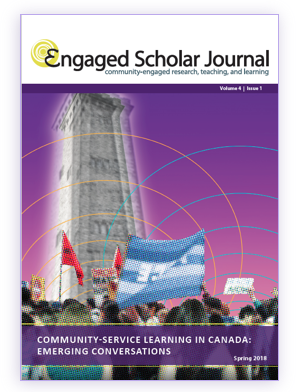Humanities for Humanity
DOI:
https://doi.org/10.15402/esj.v4i1.316Keywords:
service-learning, humanities, social justice, outreach, self-understandingAbstract
Since 2007, the Humanities for Humanity (“H4H”) course has brought together student experience beyond the classroom, educational experiences for community members who could not otherwise attend university, discussion of social justice, and studies in the humanities. By discussing a selection of rich and influential primary texts from the humanities, course members are introduced to a rudimentary history of the present, focussing on who we have become as members of a concrete social and political reality intersected by capitalism, bureaucracy, liberalism, socialism, anti-essentialism, and post-colonialism. Both the texts and the student-participant encounters are rich, and the sessions are guided by two central classical ideals: the activity of learning is primarily an end in itself, and the most important thing to learn may be who we are. The core course content of H4H is outlined, and the ways in which H4H connects student mentors and community participants are discussed. Implications are drawn regarding what makes H4H a unique form of community service-learning in which service is virtually eclipsed by learning in a process that subverts barriers between people.
Downloads
Published
How to Cite
Issue
Section
License
Authors who publish with this journal agree to the following terms:
- Authors retain copyright and grant the journal right of first publication with the work simultaneously licensed under a Creative Commons Attribution License CC BY 4.0 that allows others to share the work with an acknowledgement of the work's authorship and initial publication in this journal.
- Authors are able to enter separate, additional contractual agreements for the non-exclusive distribution of the journal's published version of the work (e.g., post it to an institutional repository or publish it in a book), with an acknowledgement of its initial publication in this journal.
- Authors are permitted to post their work online (e.g., in an institutional repository or on their website) after the publication of their work in the Engaged Scholar Journal.
- Please note that while every opportunity will be taken to ensure author participation in the editing process, due to time constraints final copyediting changes may be made before publication to ensure APA adherence throughout all submissions.




